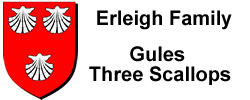Origins of the Earl, Earll, Earls, Earle, Earles Family Surname
Our Earl / Earle surname DOES originate from a Saxon word “eorl” or “jarl” which described the elder or wise man of the village.
There has been speculation that the Erleigh surname may be of Norman origin and that the family was in fact of Norman lineage and came to England with William the Conqueror in 1066.
The place-name of “Herlei” was in use before the Norman invasion and our ancestors were more than likely SAXON, not Norman.
The name of Erilaz (Erilaz or Erilaʀ) is a variant of Earl and is also thought to be linguistically related to the name of the tribe of the Heruli, and it is probably an old Germanic military title.
The name “Erilaz” (Runic) is likely the Proto-Germanic ancestor of Anglo-Saxon eorl (Modern English earl) and its relatives, meaning “man, warrior, noble”. The word erilaz is likely a derivative of *erǭ sb.f. “to fight, to battle”, thus the interpretation “one who fights, a warrior”, though it has also been connected to *arô sb.m. “eagle”.
Our Earl / Earle surname comes from the Land owned by the Family.
The historical facts show that the “SURNAME” Earle / Earl is originally derived from the land called Erleigh (now a town, spelled Earley), in England which is near the city of Reading in Berkshire county.
It is clear that this family derived their surname as a “place name” from land. This land called Erleigh was granted by Henry I, to the family between 1100 to 1135.
It is not likely that this family was of Norman origin.
Based on the history of the name it is MORE LIKELY that they were Saxon and lived in England before the Norman invasion of 1066 AD.
So far Y-DNA testing has shown this to be the case. If you are a male and your last name is Earl / Earle or similar we encourage you to get a Y-DNA test to further prove and improve what we know today.
A Concise Anglo-Saxon Dictionary: For the Use of Students
By John R. Clark Hall
References using the Eor root:
eorlweorod sn. host of noble warriors.
eorodciest sf. chosen fxind, troop, company, legion, multitude.
eorodmann sm. soldier, horseman, cavalry soldier.
manweorod (o) sm. collection of men, congregation, assembly.
eoredheap sm. mighty host. DD.
eorl sm. 1. nobleman (originally a Danish title, corresponding to the native ealdorman).
CHR. 2. (poet.) brave man, warrior hero, leader, chief 3. man.
The surname became confused with the TITLE of “EARL” in England.
The title of “Earl” in England designated an English rank of nobility.
See this article: List of earls in the peerages of Britain and Ireland
The British title of Nobility (Earl) should not be confused with the Erleigh family surname.
To this day there remains a town in England in the county of Berkshire near Reading called Earley.
The Family Surname of Erle / Earl / Earle
The Erle / Earl / Earle family surname is of very ancient origin, and the use of it in historical records can be traced back to sometime shortly after the Norman conquest of England in 1066.
Surnames were first used when the Norman barons introduced them into England. Surnames became necessary when governments introduced personal taxation. In England, this was sometimes known as Poll Tax. Throughout the centuries, surnames in every country have continued to “develop” often leading to astonishing variants of the original spelling.
The original name in historical records use the french nomenclature and was “de Erleigh” (de means “from” and erleigh is “the name of the land owned”). The name is a place-name used by a landowner and comes from a place in England called Erleigh which is located near Reading.
The first use of the surname was tied to the men of the family who were owners of the lands and manors at Erleigh. The de Erlegh family took its name from the manor of Erley, Earley or Erle, sometimes called Earley Whiteknights, in the parish of Sonning, Berkshire, England.
The First of His Name
John de Erleigh I who is the first recorded with the name died in AD. 1165. This puts his birth at some time in the early 1100s.
John de Erleigh would have been the 1st born of this family in England on the lands called Erleigh, and thus he is “from erleigh” and began carrying the name. This would mean his father owned the lands at Erleigh at the time of John’s birth, but the father may not have used the name.
This family who went by the name of “de Erleigh” were knights who possessed lands in fee and served the King of England in military service when called upon.
